Lilongwe
Very European in nature, Lilongwe is a fairly compact capital city with the sort of traffic jams that come as quite a surprise after following the lakeside road all the way from Rumphi and the beach-resort town of Nkhata Bay to the north. That road was all tarmac, with hardly another vehicle for miles and miles and miles between the villages.
Except for two massive 'sugar cane trains' that came trundling the other way during the day. These comprise a big open truck pulling two equally big trailers piled high and wide with cane. They seem to use the same technique to load these as when making straw thatch roofs. The cane overhangs the truck and trailers like the massive over-hanging eaves of big thatched houses. The trucks are already wider than standard trucks, so the whole lot takes up the entire width of the two-lane road, but at least each one is accompanied by a preceeding warning van with flashing light. So there's time to get out of the way.
These things are probably the only road vehicles in Africa that have any priority over the buses.
After Rumphi I spent a nice four days at a beach-front camp and lodge in Nkhata Bay where I met a German rider on an Africa Twin coming to the end of a four-year around-the-world journey. He was now taking a fairly direct route north, even considering a new ferry he'd heard of from Alexandria direct to Italy. And after Pakistan, the Karakorum Highway, south-east Asia and the Australian outback, the Moyale road held no worries for him.
And, "The cheapest shipping I found for a motorbike to South Africa was a sea freight route from Vancouver to Cape Town." Well, that must be one of the longest sea routes in the world - but what a thought!
"Take the lakeside road south from here," he told me. "It doesn't go up and down any mountains, nor follows the lakeside very much, but it was a very enjoyable ride, all tarmac and no traffic."
So I did. And he was right.
But not until we had quite a bit of rain in Nkhata. Two nights running, and pretty heavy the second night with one of the thatched huts leaking and guests a bit wet.
However, I was the bearer of bad news for our German friend.
"Do you know if Ethiopian visas are being issued in Nairobi now?" he asked.
I told him the most recent news I'd heard was no. He checked by phone with Jungle Junction and found that was still the case.
"What were travellers doing to get visas?" he asked.
I told him about Gareth's success getting help from his South African consulate, and all others having to post their passports home for the visa. He whisked off emails to German and Ethiopian consulates near and far, loaded up his bike, gave me some bike shop business cards from Cape Town that may be handy, and headed off north. I went south.
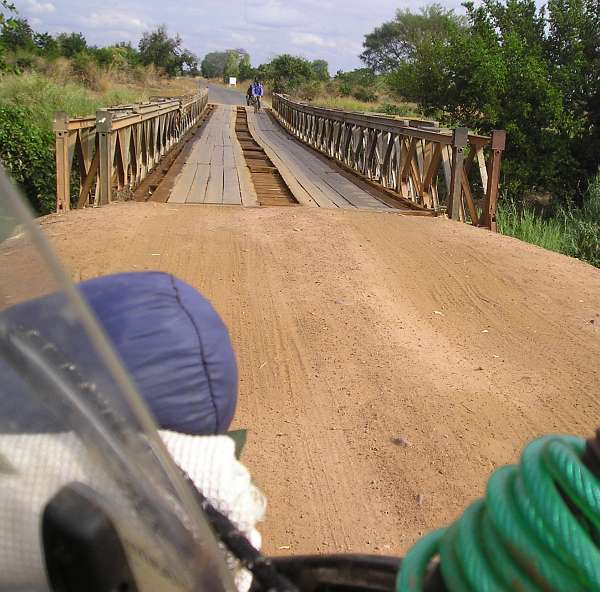
There were two bridges like this south from Nkhata. I just about had room to park at this, the second one, for photos.
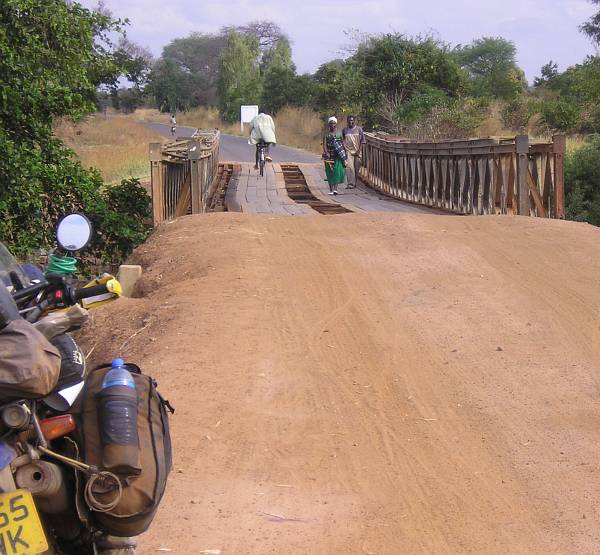
They're constructed as an open steel lattice affair. There are scaffold planks where your front wheel should go, and a view of the river below where it shouldn't.
Without a doubt, back in colonial times, the Brits brought over too many railway bridges, someone must have added an extra zero. To cover up the error they used the surplus, with planks added, as road bridges. As they say, "All comedy comes from real life."
This road goes all the way to Senga Bay at the southern end of the lake, where it branches one way to Cape Maclear and the other way the short distance to Lilongwe.
At Senga Bay I found a motel with cheap rooms and planned to look around the general stores and hardware shops for a good strong brush to clean H.M. The Bike.
In Africa, and Malawi in particular, dirty vehicles are never seen on the roads. Whether cars, lorries, buses, or two-wheel taxis with or without engines. Car and lorry cleaning is a big business.
Every evening in campsites and hotel compounds all the cars are washed, either by the drivers or the hotel cleaners. I'd become quite conscious of the state of my bike after all the Tanzanian dirt roads (and the Kenyan ones before that) and had been asked a few times, "Clean your motorcycle, mister?"
But The Bike has all sorts of things attached to it by all sorts of means, and I'd seen the enthusiasm the car washers put into their work, especially when vigorously rinsing all the dirt from everything that a car has hidden behind the wheels and under the wheel arches. So I was a bit wary about letting a car washer near my bike and decided to look for a decent brush myself.
And all campsites and hotels have buckets available for the very purpose of ensuring that Africa's roads are free of dirty cars, lorries and buses.
The final decider was at one or two of the many permanent police check points on Malawi's roads.
As elsewhere in Africa these are friendly and cheerful affairs (at least for us tourists) and when you answer the question about where you're from, there's a big grin, another shake of the hand and they want to know all about your journey.
But a couple of times a remark something like, "Well, your bike has certainly collected lots of red African dirt!" was, I think, a hint that it needs a wash!
Well, in the motel compound at Senga Bay the keen hotel cleaner, Ishmael, seemed as though he'd do a good job for a good price so I let him get on with it, saying I'd help him as well. He didn't speak much English and thought he'd best leave the panniers alone, probably thinking the water would get inside. So I attacked them, with not much effect. Some of the dirt came off, but they now have a permanent ochre-red tinge over the black canvas. Quite appropriate really.
When Ishmael was satisfied with his work, after two bucket-fulls of soapy water, H.M. The Bike certainly did look a lot more presentable, and had probably lost quite a few pounds in weight.
But, as they say, "This Is Africa!" (usually abbreviated to "T I A!") and there was more to come.
That night I left the bike right outside my bedroom window, and woke early in the morning to the sound of water sloshing about all over the place. With a discreet bit of curtain twitching I looked outside to see the two cars parked either side being thoroughly washed.
But then, after a lull, the sloshing sounds definitely seemed to be right outside my window. I checked again, to find Ishmael having an enthusiastic second go at my bike!
And sure enough, when I finally emerged to look for some breakfast, there was my bike, even cleaner than the evening before. Tyres and all! And he never even told me he'd had a second go.
That, I think, is the true face of Africa!
Another feature of Malawi is the money.
It's more expensive here than anywhere else on our route so far, part of the "things cost more the further south you go" dictum.
But, to repeat, "T I A!" as they say.
Thus, the ATMs in Malawi will only give you a maximum of eighty-five UK pounds-worth at a go. Elsewhere it's been close to two hundred.
And the reason I now find is very practical.
The largest note here is about the equivalent of two pounds 20 pence. And the notes themselves are large, getting on for A5 size. - Well, larger than any UK note and anything else I've seen on this journey. And printed on thick paper as well. It becomes a real problem carrying it all around on your person.
The result: eighty five pounds, unsquashed, is about half an inch thick, squeezing to about three-eighths.
And, I now see, that's the maximum size of those ATM security jaws that deliver the cash into your hands!
QED, as they say.
I don't know what you do when you buy a car here. You'd need a big car to carry all the cash to the car showroom to collect the car you're buying ........
As I departed Senga Bay I had a short chat with a local who wanted to know how long I'd been in Malawi and where.
"Make sure you spend plenty of time on the lake," he insisted. "After all, Malawi IS the lake!"
And I think that sums up the attitude around here. It's central to their lives.
The two-hour ride to Lilongwe winds over another mountain ridge above the Lilongwe River with big African savannah views from the top. Little photos can't hold these big scenes but here's a few anyway.
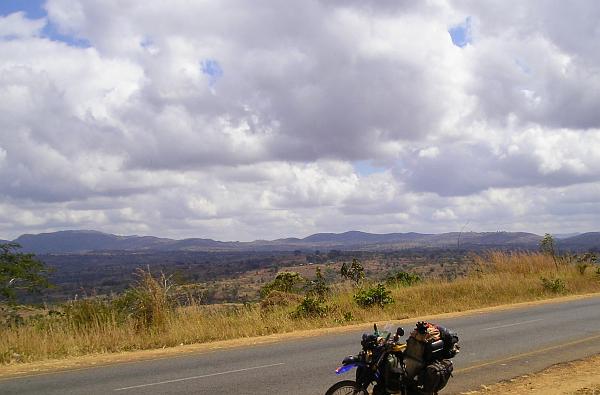
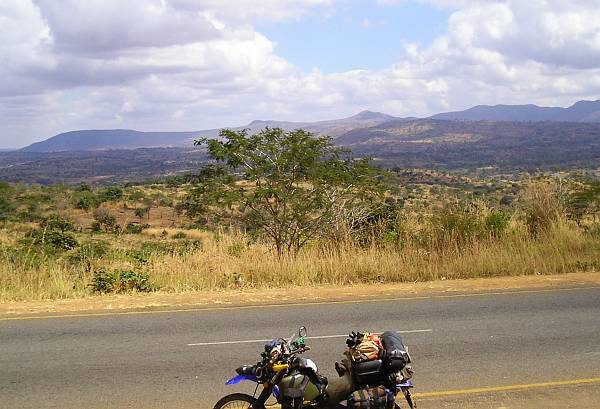
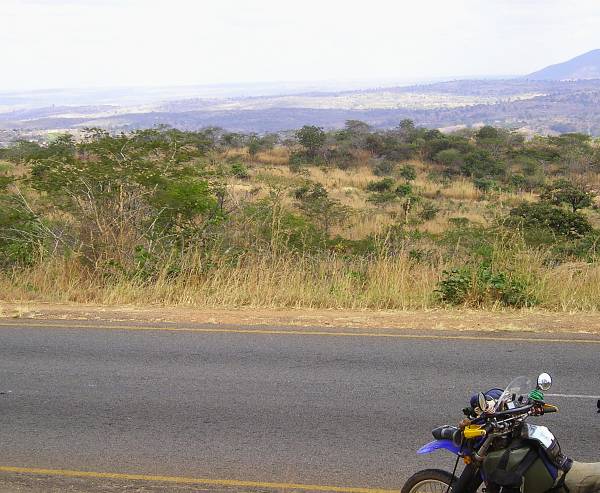
The change from Tanzania to Malawi (with its holiday-resort lake the length of the country) is similar to that between Kenya and Uganda - us 'overlanders' are crowded out by gap-year students on adventure travels. But never mind, I get confirmation here in Lilongwe that ATMs in Zimbabwe do hand out US dollars, so I don't have to avoid spending mine at border crossings.
I also met a Spanish couple here who are travelling around by bus for two months, just before they left the campsite to catch their bus to Tete in Mozambique. And it was about 9:30 am when they left. So it can't take all that long to get all the way to Tete from here, instead of staying in Blantyre. So we'll see - mustn't forget that although Malawian buses are about the slowest so far in Africa, even sticking to the 50kph speed limit in Lilongwe, they are still faster than me on the open road.
Just after writing that, Pete from New Zealand arrived by bicycle, cycling from Cape Town to Copenhagen.
For anyone reading this who was in Khartoum at the same time as us, and met the Polish cyclists there retracing the steps of the celebrated Polish bicycle explorer Kazimierz Nowak, they had a successful tour through Sudan and Pete met them at the Victoria Falls in Zambia about a month ago. So they are in front of me now, but going to Namibia after South Africa, so maybe I'll catch up with them there.
But I was the bad news bearer again. Pete asked if it was easy obtaining visas for Sudan and Ethiopia on our route. Well, it was for us, but I told him about the lack of Ethiopian visas in Nairobi. He hadn't heard about that.
"Well, it'll be a long time before I reach Nairobi so maybe it'll change. I'm taking the road west from the Tanzanian border to the southern end of Lake Tanganyika, then taking the ferry up the lake to Kigoma."
"Then round Lake Victoria through Uganda to Nairobi."
So it seems more and more travellers I meet are doing that route, and we had a long chat about it and the ferry's history.
Then Axel and Sarah arrived on an Africa Twin, from Germany, heading to Cape Town at a fair rate of knots, twice my speed (again). They reported that they met Scott, the Canadian on his way to Europe via Saudi Arabia, and who had had an entertaining time in Nairobi while we were there, obtaining his visa for Eritrea. They had crossed paths in Wadi Halfa, Sudan. Scott hadn't been able to follow his Eritrea - Saudi route. His Saudi visa took so long to acquire that his Eritrean visa expired and he couldn't get it extended at all. Consequently he was stuck with the standard Egypt - Middle East route.
So news filters steadily along the grape vine about travellers met on past occasions.
